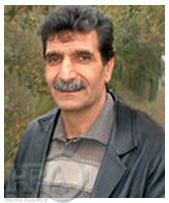Supreme Court Says “Do-over” in Death Sentence Case
 55-year-old prisoner Javad Lari’s death sentence has been overturned and sent back to the lower court. Mr. Lari’s lawyer, Manijeh Mohammadi, told the International Campaign for Human Rights in Iran that there is no evidence of moharabeh (enmity with God), her client’s charge that led to execution, and that he is innocent.
55-year-old prisoner Javad Lari’s death sentence has been overturned and sent back to the lower court. Mr. Lari’s lawyer, Manijeh Mohammadi, told the International Campaign for Human Rights in Iran that there is no evidence of moharabeh (enmity with God), her client’s charge that led to execution, and that he is innocent.
Mohammadi explained the Campaign that the charge of moharebeh was based on unrelated accusations. Under Iran’s penal code, moharebeh is meant to criminalize acts of armed action against the government.”His charges are illegally exiting the country and going to Camp Ashraf, actions against national security and propaganda against the regime by participating in assemblies after the 2009 presidential elections. But the charge of moharebeh for which he is sentenced to death is related to his membership and activities in Mojahedin-e Khalq (MEK). The collection of the his charges were reviewed in such a way that led to moharebeh and we expect that the Supreme Court will hopefully change his punishment according to the petition that we submitted.”
On 16 September 2009 intelligence forces arrested Javad Lari, a Tehran merchant. Branch 15 of the Revolutionary Court sentenced him to death on the charge of moharabeh. After his lawyers requested an appeal, the Supreme Court referred the case back to Branch 15 for further proceedings because of the flaws in his case. Judge Salavati, the presiding judge, reaffirmed Lari’s moharebeh charge and death sentence. Lari is currently in Ward 350 of Evin Prison.
Mohammadi told the Campaign that Lari accepted some of his charges but denied others. “He expressly accepted participating in some post-election events and going to Camp Ashraf in his interrogations and trial sessions, but what he vehemently denied was his membership and activities in the MEK. This charge is central in his moharebeh conviction.”
The Supreme Court overturned the execution sentence based on Lari’s MEK-related charges. “The Supreme Court, after determining that the investigations were flawed, re-sent the case to Branch 15 for further investigations. In fact, the Supreme Court was also doubtful about Mr. Lari’s membership and activities in the MEK and wanted the sentence issued with a delay and for this charge to be addressed with requisite reasoning.”
Expressing disbelief at the justification of the MEK-related charges, Mohammadi said, “For me and the other lawyer in this case, Mr. Moshkani Farahani, Mr. Lari’s membership and activities in the MEK are unbelievable. According to what is available in the case file, there is no reason for his moharebeh conviction, unless the court has other reasons which are not available in the case file; we have not seen those reasons and evidence.”
In the 1980s, Javad Lari was sentenced to three years in prison for being active in MEK.
“My and my colleague’s view is that despite Mr. Lari’s prison sentence in the 1980s for his activities in the MEK Organization, he has not had any such activities after his release and he was busy with his personal life. His actions have been mostly emotional and not operational. His trip to Camp Ashraf and his contacts have been mostly of an emotional kind. He has had some contact with some of his friends beginning in 2006 and 2007, but those contacts have all been of a friendship nature and not in an organizational context. In justifying the Article 186 charge, which is related to moharebeh, the discussion about his membership and activity in the MEK was critical, and neither he accepted it, nor do we believe in it. His other charges are marginal,” said Mohammadi.
Mohammadi also told the Campaign that she was only able to speak to her client for a few minutes before the trial. “There were direct questions about Mr. Lari’s activities in the MEK Organization. But, unfortunately, in most cases the explanations Mr. Lari provided were against himself. Unfortunately, he did not have sufficient concentration when answering questions and no matter how hard my colleague and I tried to talk to him before the court session it was futile.”
